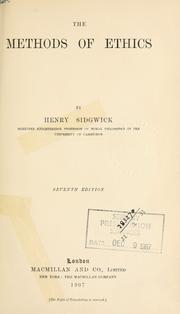The Methods of Ethics
 |
|
| Author | Henry Sidgwick |
|---|---|
| Country | United Kingdom |
| Language | English |
| Subject | Ethics |
|
Publication date
|
1874 |
| Media type | |
The Methods of Ethics is a book on ethics first published in 1874 by the English philosopher Henry Sidgwick. The Stanford Encyclopedia of Philosophy indicates that The Methods of Ethics "in many ways marked the culmination of the classical utilitarian tradition." Noted moral and political philosopher John Rawls, writing in the Forward to the Hackett reprint of the 7th edition, says Methods of Ethics "is the clearest and most accessible formulation of ... 'the classical utilitarian doctrine'". Contemporary utilitarian philosopher Peter Singer has said that the Methods "is simply the best book on ethics ever written."
Like Aristotle, Sidgwick believed that systematic reflection on ethics should begin with the way ordinary people think about moral behavior—what he calls “commonsense morality.” His main goal in the Methods is to offer a systematic and precise “examination, at once expository and critical, of the different methods of obtaining reasoned convictions as to what ought to be done which are found—either explicit or implicit—in the moral consciousness of mankind generally” (Methods, p. vii). His focus is primarily on detailed exposition of commonsense morality; he does not attempt to defend any particular theory of ethics, including utilitarianism, which he explicitly endorses in other works and speaks positively of in many passages in the Methods. However, Sidgwick’s goal is not simply exposition; he also wants to clarify, systematize, and improve ordinary morality by noting points where it is vague, undeveloped, or inharmonious, and then suggesting ways that these problems can be fixed.
Sidgwick claims that there are three general methods of making value choices that are commonly used in ordinary morality: intuitionism, egoism, and utilitarianism. Intuitionism is the view that we can see straight off that some acts are right or wrong, and can grasp self-evident and unconditionally binding moral rules. Egoism, or “Egoistic Hedonism,” claims that each individual should seek his or her own greatest happiness. Utilitarianism, or “Universalistic Hedonism,” is the view that each person should promote the greatest amount of happiness on the whole.
Most of Sidgwick’s 500-page book is devoted to a careful and systematic examination of these three methods. In the process, he identifies numerous problems with each method and often suggests clarifications and refinements in order to cast them the best possible light. His hope is that these three methods (duly clarified and systematized) will be mutually consistent, so that practical reason will be coherent and speak to us in one clear, unified voice. This hope, he argues, can only partially be satisfied.
...
Wikipedia
